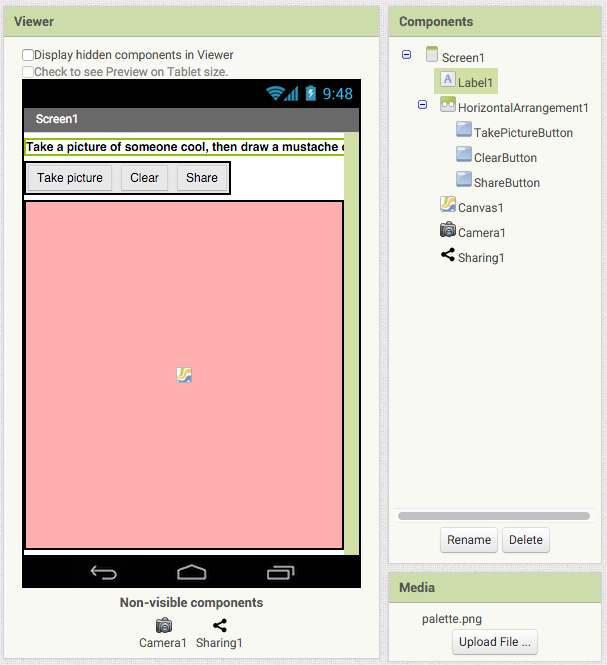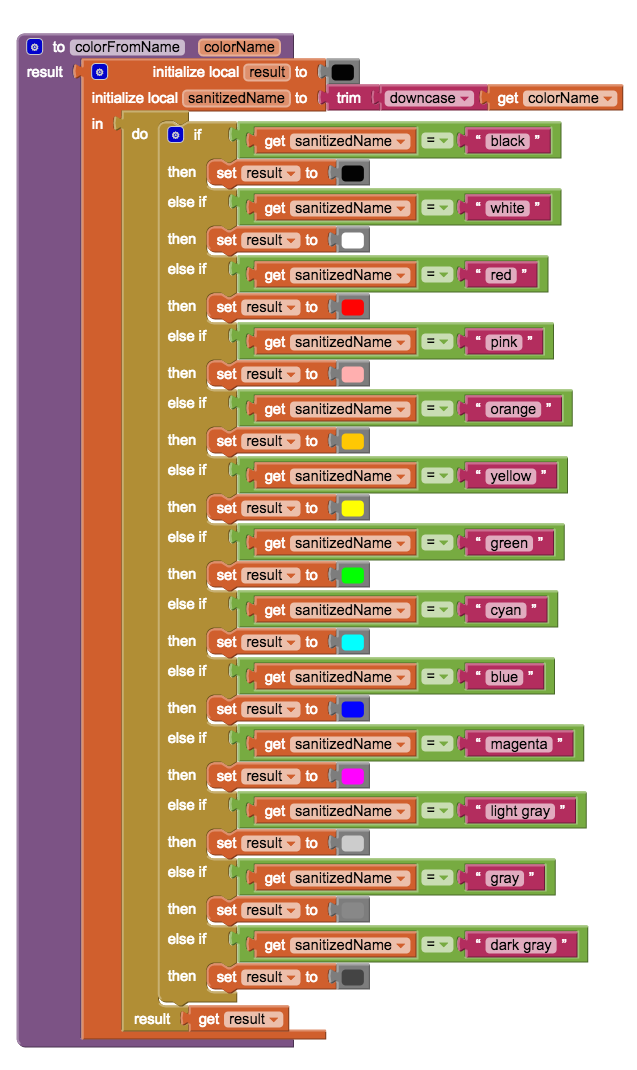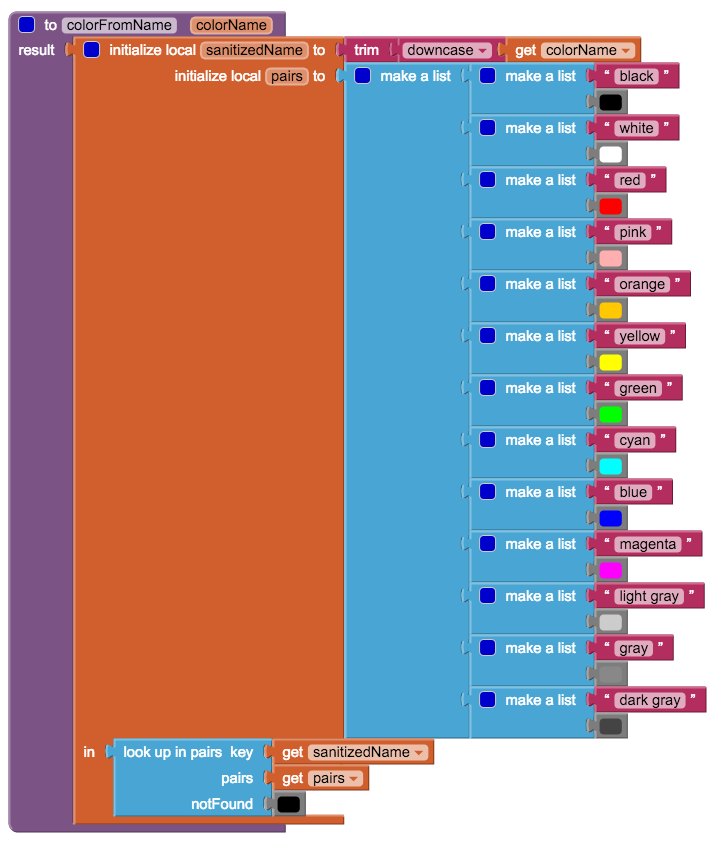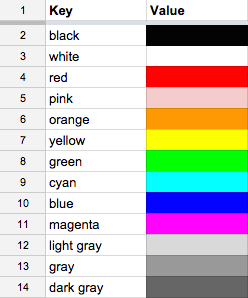Canvas¶
Imagine that you are an app inventor living in Napperville, IL. You are friends with Adrienne, a local gypsy jazz musician. Adrienne recently released a new single called Mustaches and Cat Eyes. Like any forward-thinking indie musician, she decides to create a fun app to help promote her single.
Adrienne is an avid user of App Inventor and has already made a rudimentary
first version. Unfortunately, she needs to prepare for her upcoming tour
and doesn't have time to finish it. Download MustachesAndCatEyes.aia
and import the project into App Inventor.
After the imported project loads, the screen will look like this:

Run the app on your phone. Some blocks have already been added to this
project. If you click the "Take picture" button, the Camera will
take a picture and then set it as the background image of the
Canvas. If you drag your finger across Canvas, black lines will
be drawn (this happens regardless of whether you took a picture or not).
However, this program is not yet complete! If you click on the Clear
button, nothing happens. That means that you can't afford to mess up when you're drawing the mustache, because you only have one chance to get it right!
Exercise
Add the blocks necessary to make it so that when the user clicks on the Clear button, whatever is drawn in the canvas is cleared.
Now your user can try as many times as she likes to draw the perfect mustache. But how do we bestow cat eyes upon the subject of the photo?
Exercise
Add some blocks so that when the user touches the canvas, a cat emoji is drawn at the point where she touched. Note that you will need to use the Canvas1.Touched block. Feel free to use this emoji: 😸
x and y input variables inside Canvas1.Touched represent coordinates.Adrienne is pretty pleased that the Clear button works, but she tells you
that there are a whole bunch of cat face emojis, and she wants to be able to
choose which one to draw on the canvas. For this, you'll need to drag a ListPicker into your screen. Rename ListPicker1 to CatListPicker and set its ElementsFromString field to:
😸,😹,😺,😻,😼,😽,😾,😿,🙀
Exercise
Change your program so that when the user touches the canvas, the selected cat emoji is drawn.
CatListPicker that represents the text of the current selection.Adrienne loves the new feature, and promptly sends you a picture of herself with 😻 as her right eye and 😽 for the left eye. But she tells you that you're not done yet, because she wants to be able to draw mustaches in other colors.
To solve the multicolor mustache problem, we need some kind of color picker widget. Unfortunately, such a widget doesn't exist in App Inventor. You can try implementing one on your own!
Exercise
Add another ListPicker called ColorListPicker to your screen. For now, set its ElementsFromString field to "black, red, green, blue". Add new blocks to your program so that after the user selects a color, she can drag on the Canvas to produce lines in that color.
ListPicker1.AfterPicking and Canvas1.PaintColor.else if blocks.This is definitely a viable way to create a simple color picker, but if
you wanted to support all 13 basic colors in App Inventor you'd end up
with an if block that contains more than 70 blocks! If you did it as
a procedure (making it more reusable), it would look something like this:

As usual, there's a better way to do it. Download ColorPicker.aia and import it into App Inventor. This project implements a color picker that was made in a less obvious way, but is easier to work with in the long run:

As you can see, it's a procedure whose distinguishing feature is that it
uses a list of lists. It looks fatter than the previous procedure, but trust us, it uses far fewer blocks. Each sublist in the pairs list is actually a key-value pair. In other words, pairs is a lookup table. Conceptually, it's equivalent to a spreadsheet with two columns:

The look up in pairs block at the bottom of the procedure looks for
a key (left column) and returns the corresponding value in the same row
(right column). If the key is not found, then it returns whatever you
put in the notFound slot (in this case it's a black color
block).
So, this color picker seems decent enough, but it's in the wrong project. You could just rebuild it block-for-block in the Canvas project but that seems a bit laborious. This is the problem that the Backpack is designed to solve! It's that thing in the upper right corner of the Blocks interface:

Drag the colorFromName procedure block and the ColorListPicker.AfterPicking block into the Backpack. Now, select My Projects from the menu and go back to the MustachesAndCatEyes project. In Blocks, drag both blocks from the Backpack into your project. Set the ElementsFromString field of ColorListPicker to:
Black, White, Red, Pink, Orange, Yellow, Green, Cyan, Blue, Magenta, Light Gray, Gray, Dark Gray
Run your app to make sure that you can draw with all those different colors. Yay! Adrienne is happy with her app and it's a big hit (at least among the residents of Podunka). One day, your Aunt Sarah calls you up and says that she wants to draw a beige mustache on her cockerdoodle and could you please add beige as a color choice. A few hours later, you get a text from Puddles the cockerdoodle requesting the addition of turquoise.
Exercise
Add beige and turquoise to the color picker. Note that neither of these colors is built-in.
Excellent! In this chapter, you learned about Canvas, using lists of
lists as lookup tables, the Backpack feature, and how to use any color.
You've taken another step closer to becoming Master of the Universe!